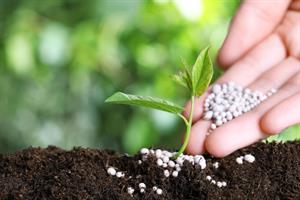PDF chapter test TRY NOW
The inorganic fertilisers are prepared synthetically in industries. They contain nutrients needed for plants. Inorganic fertilisers are also known as chemical fertilisers.
The essential chemicals used as fertilisers are nitrogen, phosphorus, and potassium. They are added to the soil in a particular ratio to obtain a good yield.

Phosphorus fertiliser
The chemicals used in fertilisers are of various uses to plants and soil.

Chemical fertilisers helps to fight diseases in plants
Uses of chemicals present in fertilisers and their relation with plants:
- Nitrogen - Used to promote rapid growth, protein synthesis, and used as the main constituent of chlorophyll that balances photosynthesis.
- Potassium - Used for resistance to drought and diseases, to increase the quality of grains.
- Magnesium - Helps in the uptake of other nutrients.
- Sulphur - Gives dark green colour to plants.
- Phosphorus - Aids in cell growth, seed formation and is also beneficial for the root's growth.
The advantage of inorganic fertilisers is that it provides fast results when compared to organic fertilisers.
Inorganic fertilisers' disadvantage is that it reduces soil fertility, pollutes underground water, and depletes the soil's secondary nutrients such as sulphur and zinc.
